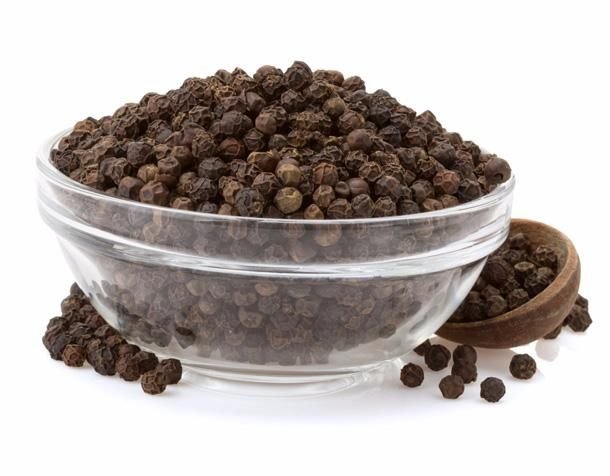Black pepper (Piper nigrum) is a flowering vine in the family Piperaceae, cultivated for its fruit which is usually dried and used as a spice and seasoning, known as a peppercorn. When fresh and fully mature, it is approximately 5 millimetres (0.20 in) in diameter and dark red, and contains a single seed like all drupes. Peppercorns and the ground pepper derived from them may be described simply as pepper, or more precisely as black pepper (cooked and dried unripe fruit), green pepper (dried unripe fruit), and white pepper (ripe fruit seeds).
Black pepper is native to south India and is extensively cultivated there and elsewhere in tropical regions. Currently, East Africa region is the world's biggest producer and exporter of pepper, producing 20% of the world's Piper nigrum crop as of 2013.
Dried ground pepper has been used since antiquity both for its flavour and as a traditional medicine. Black pepper is the world's most traded spice and is one of the most common spices added to cuisines around the world. Its spiciness is due to the chemical piperine, not to be confused with the capsaicin characteristic of chili peppers. It is ubiquitous in the modern world as a seasoning and is often paired with salt.
What are the benefits of black pepper?
11 Science-Backed Health Benefits of Black Pepper
High in antioxidants. Free radicals are unstable molecules that can damage your cells. ...
Has anti-inflammatory properties. ...
May benefit your brain. ...
May improve blood sugar control. ...
May lower cholesterol levels. ...
May have cancer-fighting properties. ...
A versatile spice.
How much black pepper should you eat a day?
There is no harm including it in your diet, but make sure to consume it in moderation. Do not have more than 1-2 teaspoon of black pepper every day. Having it in excess can have multiple side effects.
Contact Us For Quotation:

